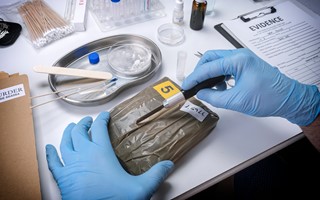News April 23, 2020 4m
‘Learning from the Past and Planning for the Future’ (March 2020)
The annual Forensic Science Regulators conference took place in Birmingham on Tuesday 10th March. This was Dr Gillian Tully’s last conference as the regulator as she leaves office in November 2020 after a 6-year term.
During this time, she has made significant changes to the industry including the necessity of the Forensic Science Regulator Codes of Conduct and Practice to be incorporated into the accreditation requirements for Forensic science providers (FSPs). She’s also made significant headway into obtaining Statutory Enforcement Powers for the Forensic Regulator’s position.
Sadly, this is unlikely to come to fruition during her term due to other significant parliamentary events taking precedence.
The opening address by Dr Tully focussed on the highs and lows of the last 5 years. These highs included an increased focus on training and support across forensics science, more forensic techniques being validated and the improvements in the Contamination Elimination Database (CED) resulting in over 1000 profiles being removed from the NDNAD as unidentified crime scene samples.
The lows were the infamous Randox Enquiry, Key Forensic Services going into administration and being bailed out by the public purse and lastly the cybercrime attack on Eurofins Forensic Services. More information can be found in the Forensic Science Regulator Report 2019.
The independence of experts was discussed, with the assertion that scientific experts should not be referred to as ‘prosecution scientist’ or 'defence scientist’. Forensic Access experts are truly impartial as they undertake work for the police and crown prosecution service (CPS) as well as for defence solicitors. We agree that this gives them a better understanding of the criminal justice system as a whole and where expert witness evidence sits within it.
For those of you who didn’t attend, here are the five take-home lessons from the conference:
Cost does not equate to Value
Certainly the Key Forensics administration and quality failures at Randox can be largely attributed to the huge cut in prices that forensic providers have been forced to adopt in order to remain ‘competitive’. Both of these instances highlight the point that a lower cost doesn’t mean you are getting better value.
Accreditation does not equal Quality
The theme of Dr Tully’s address was to see Quality as everyone’s responsibility with the overall aim being to not see accreditation as the goal, but quality as the goal. The accreditation standard referred to here by the forensic regulator, ISO 17025 requires holders to regularly audit their systems and processes and undergo an annual audit by the awarding body, United Kingdom Accreditation Service (UKAS). Her view is that there are too many companies that rely on UKAS to find their weaknesses when the people most likely to know and discover them are those doing the job day to day. There is a general misconception that Standard Operating Procedures (SOP’s) obliviate the need for expertise, which is simply not the case.
All staff ought to be encouraged to raise issues, review and amend SOP’s and report quality failings across all forensic services as this supports continuous improvement, strengthens quality and gives ownership of quality standards within the company to all.
The vision for the future is to ensure that quality forensic science is available to everyone; all law enforcement agencies, prosecution, defence, Criminal cases review commissions (CCRC), Independent office for police conduct (IOPC). And that all parties are on an even playing field in terms of policies, funding and accreditation.
This will bring equilibrium to the level of quality of forensic science across the Criminal justice system (CJS).
Timeliness ≠ contractual obligations
Most of the FSP’s are required to work to strict turn around times as part of the contracts through which they deliver the work to the police. These turnaround times are generally set at a standard two weeks. Very often the work is not required to be completed so quickly, but since financial penalties are charged for non-delivery, the work is delivered to these deadlines.
There is an argument for the work to be delivered in a timely manner but whether that equals the 2 weeks demanded by the contractual obligations is another matter.
What works locally does not always work nationally
More recently the different stakeholders in the forensic industry have come together as part of the Transforming Forensics Programme and the Forensic Capability Network (FCN) to develop a more integrated service that better serves the CJS. Dr Tully was keen to stress that this would not look like a ‘Forensic Science Service’ model but would involve Police forces working together in a collaborative approach with the aims of the entire CJS at the forefront of any decision making.
She was also mindful to highlight the fact that what may work for a force at present may not always be the best model when delivered on a national scale.
Innovation requires thinking time and collaboration
This collaboration and thinking time is vital between forensic practitioners, academia and the private sector.
Dr Tully highlighted specific areas where the focus was on improvement. For example, using more challenging proficiency test material which in turn would strengthen competency proof for practitioners.
There were also suggestions around improvements in evidence handling and the importance of good casework management systems as well as increased clarity and transparency in reporting the results to the criminal justice systems (CJS).
Innovation is a necessity in science in order to facilitate improvements. Due to the large reductions in prices the private FSP’s have seen in the last 10 years there are no funds available to allow for ‘thinking’ time, something that is vital when trying to come up with new methods and ways of improvement. In addition, the competitive marketplace has pitted private forensic companies against each other which leaves providers reluctant to collaborate on new initiatives and approaches. The regulator advises that this collaboration must take place between FSP’s, the police forces and academia in order to drive quality forensic science within the UK forward.
To find out more about forensic services offered by Forensic Access fill-in our online contact form or Tel: 01235 774870 to speak with our team.


